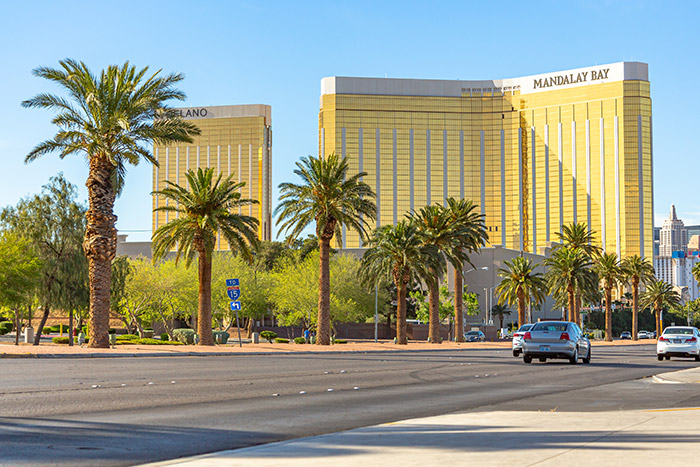Is Mandalay Bay Hotel Liable for the Mass Shooting under Nevada Law?
Much discussion has occurred after the recent shooting involving a madman who unloaded automatic style weapons from an elevated floor through the broken windows of his Casino suite. The victims all were attending the Route 91 concert across Las Vegas Boulevard—the famous Las Vegas “Strip” on a calm Sunday, October 1, 2017. With 59 reported deaths, and hundreds injured, many critically, the mass shooting was the worst in terms of deaths in reported history. With the shooter dead—having apparently killed himself in his room prior to swat officers blowing open the door, there is not much financially for the victims to go after. Recently, a law firm filed a motion to freeze the assets of Stephen Paddock’s estate, which may or may not have much in terms of liquid assets. Rumors have played out that Mr. Paddock may have had millions given his gambling history, and had apparently had one year in 2015 where he made over $5 million. That will not be enough to compensate the victims, and the reality, is that rarely are there successful gamblers—so this author ventures to say that even if he did have hidden assets it won’t be enough to compensate the horrific injuries that took place.

3rd Party Liability- Negligence and Products’ Liability.
Some attorneys will focus their attention in this case to the hotel. The hotel is the premises where the shooter used as a base. Facts are still being discovered as to what he did, how long he did it, and how he prepared. News reports have surfaced that he had video surveillance of the halls, and may have barricaded the stairwells to prevent police from approaching during his machine gun tirade on innocent people. More facts will eventually be discovered. These are important facts to attorneys.
Under basic negligence law, a duty must exist in order for someone to be negligent. The duty here is one of the hotel-to its guests. That duty may also present itself in the form of invited guest duty, and to guests who may be in and around the facility. There is a legal duty to hotel guests. The Route 91 concert was on land owned by MGM, parent to Mandalay Bay operating company. MGM is now two businesses, a casino and hotel operator, and now operates a REIT, with a real estate investment trust owning the physical structures and the land. This author is not certain whether Mandalay Bay may be the actual owner or operator of the land, but it’s a better fact for those victims as Mandalay Bay may have liability for the way the fence was installed around the venue preventing persons from being able to evacuate. Victims, who were guests of the hotel, and actually attended, have a stronger relationship to the duty owed by the hotel. Under Nevada Law, the Supreme Court of Nevada issued a ruling in the Smith v. Nugget case decided in 2011. In that case, the Supreme Court of Nevada decided that the Estate of Mr. Smith (who was shot in the parking lot of the respondent’s casino) had no duty owed to Mr. Smith. This case stated that Duty (the first element of Negligence) is per NRS 651.015 an issue for the judge to decide. Typically the jury decides whether a duty exists. In Nevada, the legislature made it clear, in cases involving Innkeepers and hotels, that judges must determine whether a duty exists. Whether a duty exists basically comes down to whether the act was “foreseeable.” Here, hotels will argue that unless an incident such as this has occurred previously—where a gunman has shot out the window of a hotel, there will be no liability. However, that analysis is flawed. Under Nevada law there is a two-pronged test to determine whether a wrongful act is “foreseeable” and thus gives rise to a duty as a matter of law. The Legislature provided a definition in NRS 651.015(3). The subsection provides that a wrongful act is not “foreseeable” unless:
(a) The owner or keeper failed to exercise due care for the safety of the patron or other person on the premises; or (b) Prior incidents of similar wrongful acts occurred on the premises and the owner or keeper had notice or knowledge of those incidents.
So, whether the act of the shooter here was foreseeable is a determination for the judge, and the guidance for the judge is NRS 651. Under this section, a judge may use either prong to find that Mandalay Bay was or was not owing a duty to the victims. If it is discovered through litigation that previous “similar” incidents did not exist which would make the act foreseeable, then the Court can look to the reasonable care that was or was not exhibited to the guests by virtue of the care they took in preventing or enabling the shooter to execute his plan. Clearly, the shooter had much planned. Many rifles were used, and thousands of rounds of ammunition were carried to the room. What did this mega hotel do to protect its guests and prevent such a horrific event? Well, some will argue they did what they could. They had an unarmed security guard. They had cameras. Others will argue this is not enough in today’s terrorist environment. Hotels are like mini-cities, and they must protect. A unarmed guard is not a guard—he is a human camera. It does not protect. What policies were used or not used to help identify that this madman had bunkered his hotel room into a weapons depot? What technology, other than cameras, was used to identify the presence of gunpowder, or metal detection? So, if a lawyer can persuade a judge that Mandalay Bay had a duty then the case will at least head to a jury for the ultimate decision on whether they acted unreasonable, and that unreasonableness caused their injuries. Steve Wynn, the hotel magnate with ultra luxury properties went on the record as stating this type of event would not happen at his hotels. That “do not disturb” lasting for 2 or 3 days is unreasonable for a hotel to just sit. Too much could be happening in that room. It is well known that Mr. Wynn increased the security at his resorts in light of the recent occurrences.
Not in thorough discussion here, is whether the shooter’s gun, its bump stock, may be liable under a product’s liability theory. That theory is more viable then the hotelier’s liability because Product’s liability cases are “strict” liability. This means that if a business creates an unreasonable risk of harm when it makes its product, and that product injures someone, then liability is created. Here the bump stock manufacturer Fire Slide, LLC, may very well be liable under a theory of strict products liability, in that the product, under Nevada law, created an unreasonable risk of harm. The elements for a claim of strict product liability are:
- That the product was defective;
- That the defect existed when the product left the defendant’s possession;
- That the product was used in a manner, which was reasonably foreseeable, by the defendant; and
- That the defect was a cause of the damage or injury to the plaintiff.
Nevada recognizes the doctrine of strict tort liability for defective products. Valentine v. Pioneer Chlor Alkali, 109 Nev. 1107, (1993)., Courts seek to place responsibility for injuries caused by defective products wherever it will most effectively reduce the hazards to life and health inherent in the marketing of defective products. Allison v.Merck and Co., Inc., 110 Nev. 762, 878 P.2d 948, 952 (1994). Although manufacturers are not insurers of their products, where an injury is caused by a defective product, responsibility is placed upon the manufacturer and distributor of that product.
In order to bring a successful products liability suit in Nevada, a plaintiff must prove:
- That the product had a defect which rendered it unreasonably dangerous;
- The defect existed at the time the product left the manufacturer; and
- The defect caused the plaintiff’s injury.
Fyssakis v. Knight Equip. Corp., 108 Nev. 212, 826 P.2d 570, 571 (1992). A manufacturer or distributor is of a product is strictly liable for injuries resulting from a defect in the product that was present when it left its hands. Ginnis v. Mappes Hotel Corp., 86 Nev. 408, 413, 470 P.2d 135, 138 (1970).
If you or someone you know was injured from the October 1, 2017 Las Vegas shooting, contact the attorneys at Benson & Bingham Accident Injury Lawyers, LLC to understand your rights.
Free Consultation

